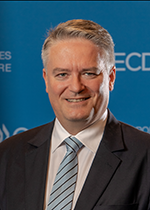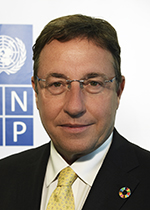OECD/UNDP Partnership
The Organisation for Economic Co-operation and Development (OECD) and United Nations Development Programme (UNDP) have joined forces to extend the global reach of Tax Inspectors Without Borders (TIWB) and to scale-up operations. The partnership was launched at the Third Financing for Development conference in Addis Ababa on 13 July 2015 and was welcomed by stakeholders from business, civil society, as well as OECD and developing country governments attending the conference. The Initiative was widely hailed as capable of assisting developing countries mobilize much-needed domestic revenues in support of the post-2015 sustainable development agenda. The TIWB Initiative facilitates targeted, tax audit assistance programmes in developing countries across the globe. The TIWB Initiative is a strong response to the attention given to effective and efficient mobilisation of domestic resources in achieving the Sustainable Development Goals and the commitments made by the international community in Addis Ababa to strengthen international tax co-operation.
The OECD's technical competence in tax matters and its network of tax experts is complemented by UNDP's country-level presence around the world, its access to policy makers at the highest level, and its policy and programme expertise in public financial management. The partnership is comprised of the following features:
- A joint OECD/UNDP TIWB Secretariat based in Paris and supported by UNDP's network of Country Offices in developing countries that establishes, coordinates and facilitates each TIWB expert deployment. UNDP's Country Offices promote the TIWB Programmes with senior officials and ministers in developing countries and assist Host Administrations in completing the request procedure.
- A multi-stakeholder Governing Board, co-chaired by the OECD's Secretary General and UNDP's Administrator includes governments from Partner and Host countries, regional organisations, civil society and business, and monitors the operations of the TIWB Secretariat.
- Funds from governments and/or private foundations for the financing of the TIWB Programmes and involvement of the UNDP country offices are channelled to UNDP. Funds channelled to the OECD are used to finance the joint TIWB Secretariat and the operations of the Governing Board.
OECD Secretary-General Mathias Cormann and UNDP Administrator Achim Steiner jointly oversee the TIWB Initiative and serve as Co-Chairs of the Governing Board.
The importance of international co-operation has never been greater, whether facing the humanitarian and economic crisis resulting from the war in Ukraine, dealing with the COVID-19 pandemic, meeting the climate challenge, or the promise and challenges of the digital economy. TIWB, therefore, remains as relevant as ever, helping developing countries across the world to mobilise domestic resources to build better futures for their citizens and to attain the SDGs.
“Sustainable finance is key to investing in development for all. Taxes are the most reliable and stable source of revenue for most states. Moreover, taxation fosters the social contract between citizens and the state. Thus effective, efficient and fair taxation is of crucial importance. The TIWB plays an important role in supporting governments to strengthen their tax systems and make taxation fairer.”
The OECD and UNDP have joined forces to extend the global reach of TIWB and to scale-up operations.
UNDP contributes in the following ways:
- Through its country offices, supports development and completion of TIWB programmes in developing countries;
- Promotes lessons learned and the sharing of good practices of TIWB country programmes with the international development community;
- Manages a roster of tax audit experts;
- Manages designated donor financial resources for TIWB activities;
- Handles contracts for retired experts (or former tax officials) participating in TIWB programmes.
The OECD contributes in the following ways:
- Hosts the TIWB Secretariat at the OECD offices in Paris;
- Identifies and provides support to host tax administrations on technical taxation issues and assists host and partner tax administrations in the set-up of TIWB programmes;
- Provides technical support to UNDP on selection and quality assurance of the roster of tax audit experts;
- Develops manuals, tools and research on best administrative practices in tax administrations and for TIWB Programmes.
- Monitors, assesses and reports on results of TIWB programmes.




